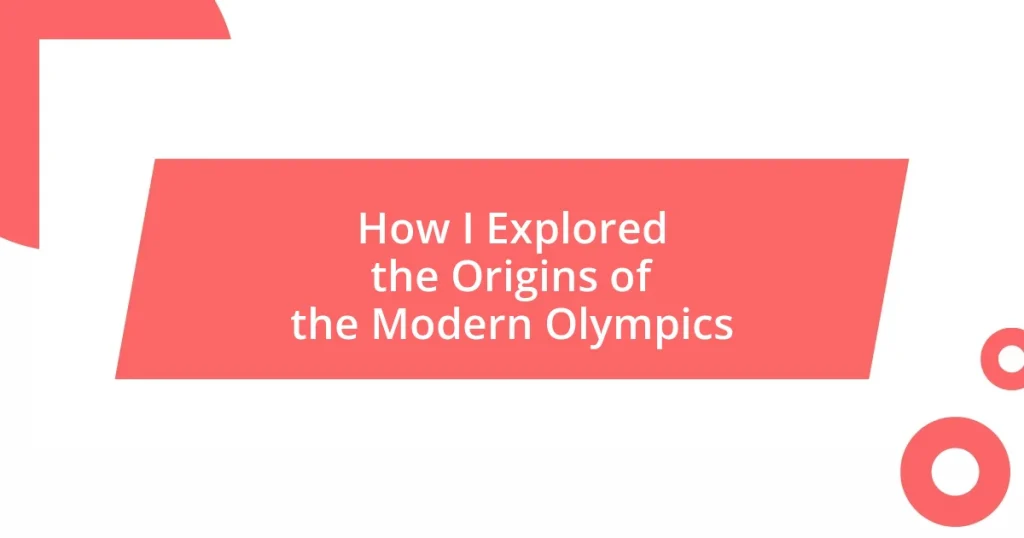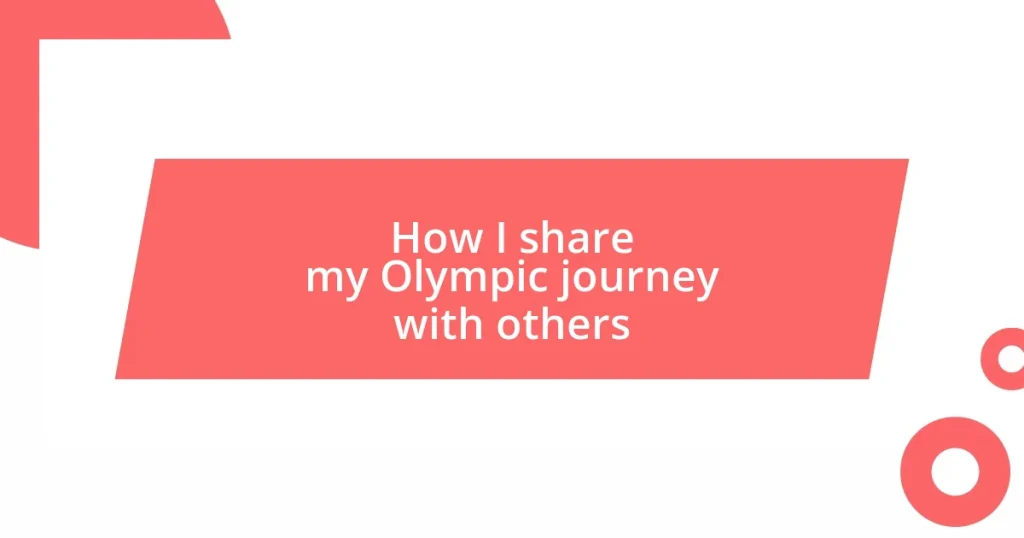Key takeaways:
- The Modern Olympics began in 1896 as a revival of ancient Greek traditions, serving as a platform for international unity and political statements, exemplified by the significant 1936 Berlin Games.
- Key figures like Pierre de Coubertin, Jesse Owens, and Wilma Rudolph shaped Olympic history through their contributions to promoting peace, courage, and resilience in sports.
- The Olympics continue to impact culture and social change, fostering global camaraderie and allowing athletes to advocate for critical issues while introducing audiences to new sports and cultures.
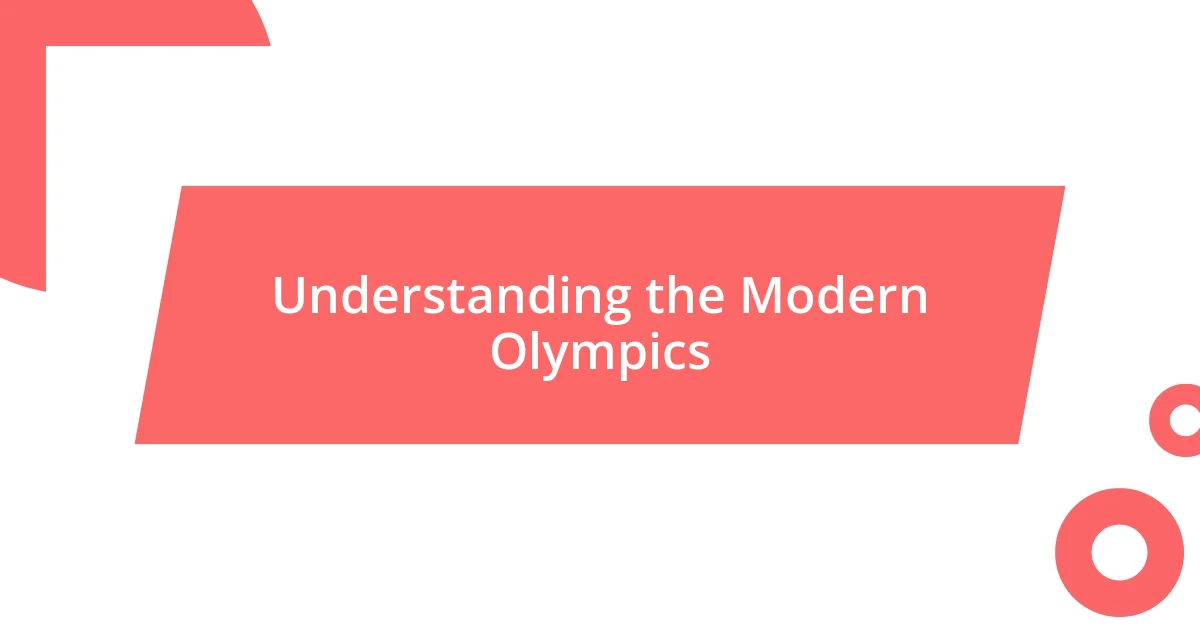
Understanding the Modern Olympics
The Modern Olympics, rooted in a rich tapestry of history, began in 1896 as a revival of ancient Greek traditions. When I first learned about the enthusiasm surrounding the inaugural event in Athens, it struck me how deeply sports can unite diverse cultures. Isn’t it fascinating to think that this spirit of camaraderie and competition still defines the Games today?
As I delved deeper, I discovered that the Olympics transformed into a global stage not just for athletic prowess, but also for political statements. For instance, the 1936 Berlin Games carried a weight of significance far beyond sports, embodying the tensions of its era. It’s mind-blowing to consider how a single event can echo larger societal issues—what narratives do we envision when we think of “the Games”?
Experiencing the Olympics through various mediums—like documentaries, books, or even live events—has given me a newfound appreciation for the athletes’ narratives. Every determined face tells a story of sacrifice and ambition. Have you ever watched an athlete cross the finish line and felt that surge of joy and relief? It’s not just a victory for them; it reflects years of hard work and dreams shared by countless others.
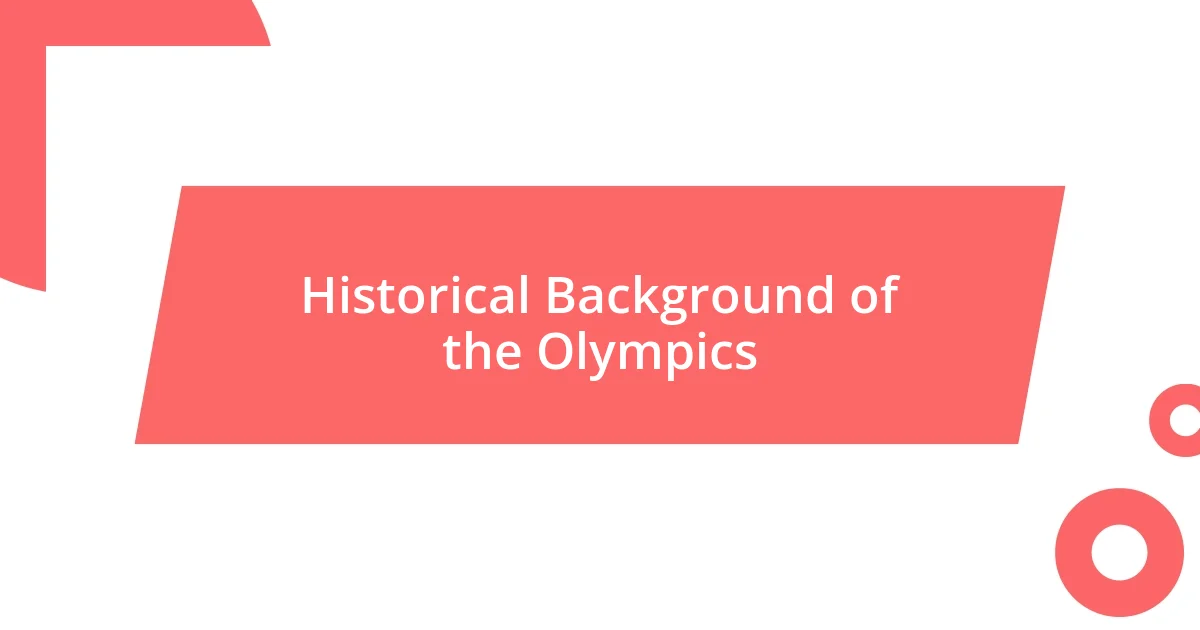
Historical Background of the Olympics
The Olympics can trace their roots back to ancient Greece, where they were held in Olympia starting in 776 BC. This initial celebration of athleticism was more than just competition; it was intertwined with religious observances honoring Zeus. When I reflect on how these ancient Games brought people together from different city-states, I can’t help but draw parallels to the present-day Olympics. They served as a unifying force in a world rife with conflict—something I truly admire.
Some key historical highlights include:
- 776 BC: The first recorded Olympic Games held in Olympia.
- 393 AD: The Roman Emperor Theodosius I abolished the Games, viewing them as pagan.
- 1896: The Games were revived in Athens, marking the beginning of the Modern Olympics.
- 1900: Women participated in the Olympics for the first time, competing in tennis and golf.
- 1936: The Berlin Games became a platform for Nazi propaganda, demonstrating the intersection of sports and politics.
Thinking about these moments in history evokes a sense of wonder in me—how something so ancient could evolve into the magnificent global event we know today. Have you ever watched the torch relay and felt a connection to the past, as if you’re part of that ongoing legacy?
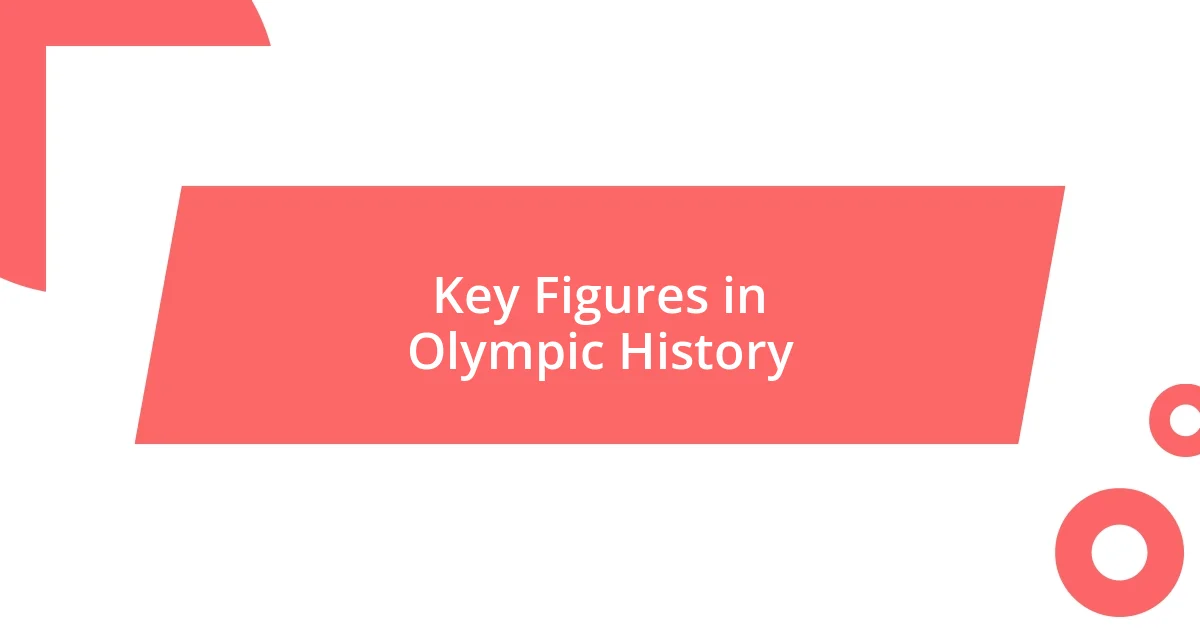
Key Figures in Olympic History
Key figures have played pivotal roles in shaping the Olympics we know today. For instance, Pierre de Coubertin, the founder of the Modern Olympics, envisioned a celebration of athletic excellence that would promote peace and international understanding. When I stumbled upon his writings, it was inspiring to see his unwavering belief in the power of sports to bridge cultures. Have you ever felt that same spirit when watching athletes from different nations compete side by side?
Another significant figure is Jesse Owens, whose triumph at the 1936 Berlin Games transcended athletics. Winning four gold medals while defying Nazi ideologies, Owens became a symbol of hope and resilience. His victories resonated with me deeply; it’s astounding how a moment in sports can echo principles of courage and determination. Have you reflected on how athletes like Owens become champions not just of their sports, but also of social change?
Lastly, I can’t overlook the contributions of female athletes like Wilma Rudolph. Overcoming polio, she became the first American woman to win three gold medals in a single Olympics in 1960. It’s awe-inspiring to me how her story exemplifies perseverance and strength in the face of adversity. Don’t you think her legacy continues to inspire future generations of athletes around the world?
| Key Figure | Contribution |
|---|---|
| Pierre de Coubertin | Founded the Modern Olympics, promoting peace and international understanding. |
| Jesse Owens | Won four gold medals in 1936, confronting Nazi ideologies and symbolizing hope. |
| Wilma Rudolph | First American woman to win three gold medals in a single Olympics in 1960, exemplifying strength and perseverance. |

Significant Ancient Olympic Events
The ancient Olympics had some truly remarkable events that showcased the physical prowess of athletes. One standout event was the Pentathlon, which was a combination of five disciplines: running, wrestling, long jump, javelin, and discus. I can’t help but admire how this test of versatility not only emphasized individual strength but also required a well-rounded skill set. Have you ever thought about how today’s athletes often specialize, yet those ancient competitors had to excel in multiple areas?
Another fascinating event was the Chariot Races, held in the hippodrome, where skilled charioteers raced around a massive track. The level of risk involved was incredible. I remember watching a documentary that described the chaos of those races, with chariots colliding and horses galloping at full speed. It made me realize how exhilarating—and dangerous—competition was in ancient times. Can you imagine witnessing such intense rivalry, where both skill and luck played pivotal roles?
Lastly, the Wrestling events stood out not just for their intensity, but for their cultural significance. It was a test of both strategy and brute force, and champions earned deep respect in their societies. Reflecting on this, I think about how wrestling connects us to our origins, as it’s one of the oldest sports known to humanity. It reminds me of how athletic traditions can carry the weight of history—do you feel that same connection when watching a wrestling match today?
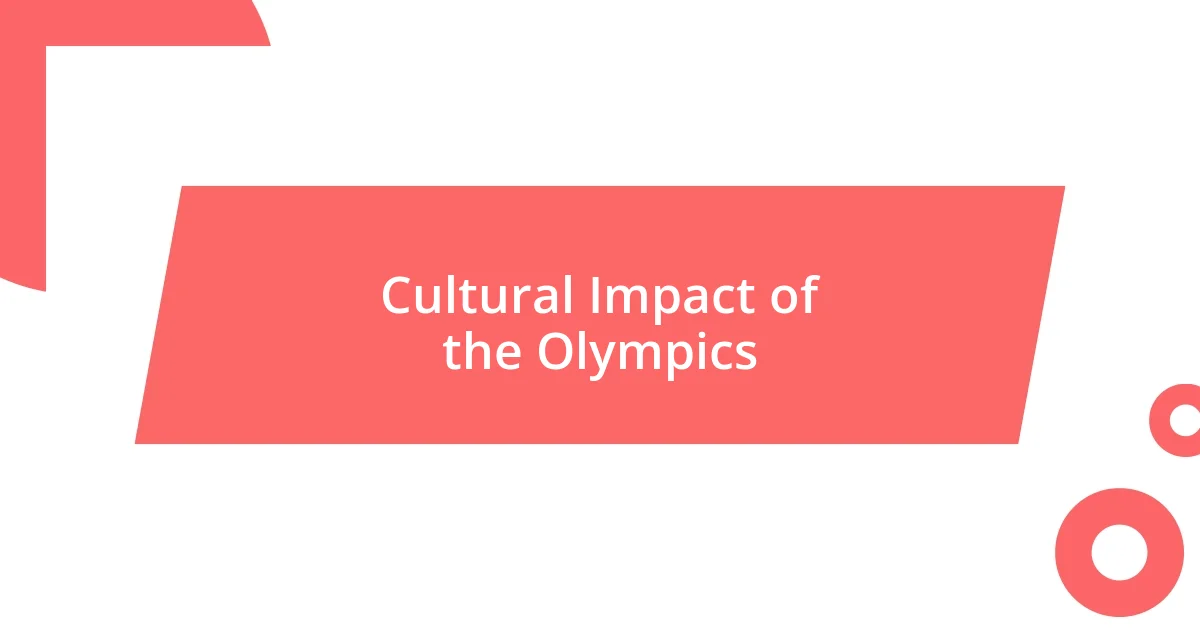
Cultural Impact of the Olympics
The Olympics act as a powerful cultural touchstone, uniting diverse nations in a shared celebration of athleticism. I vividly remember the palpable excitement during the opening ceremonies as athletes from around the globe marched in, representing their countries with pride. It struck me then how this moment fosters a unique sense of global camaraderie, transcending political and social barriers. Have you ever felt that rush of unity when witnessing such a vibrant display of our world’s cultures?
Sport, as seen through the lens of the Olympics, also serves as a platform for social change. I think back to the recent Games and how athletes used their platforms to advocate for issues such as racial equality and climate change. This kind of activism in the sphere of sports didn’t just grab headlines; it left a lasting impact on viewers and brought attention to critical topics. Doesn’t it leave you hopeful when athletes become voices for change, inspiring future generations to use their own?
Moreover, the Olympics create lasting cultural legacies, from national pride to global recognition of various sports. I recall the first time I watched rugby sevens debut at the Olympics—it ignited a passion within me for this lesser-known sport. I could see firsthand how it captivated audiences and encouraged nations to take pride in athletic disciplines beyond the mainstream. Isn’t it fascinating how the Games can introduce us to new cultures and sports, enriching our understanding of the global community?

Personal Journey of Olympic Exploration
Delving into the origins of the modern Olympics has been a truly eye-opening experience for me. I remember visiting the Olympic Museum in Lausanne, Switzerland, where I was surrounded by artifacts and stories from both ancient and modern games. Just standing in that space filled me with a profound appreciation for the journey athletes have taken over centuries. Have you ever realized how history unfolds in such tangible ways?
As I traced the timeline of the Games, I couldn’t help but reflect on my own experiences with sports. Participating in track and field during high school taught me the importance of discipline and resilience. Each race felt like a mini-Olympics, and I could feel that same spirit of competition coursing through my veins. It makes me wonder—how often do we find echoes of the Olympics in our everyday pursuits?
I’ll always cherish my conversations with fellow enthusiasts who share my passion for the Games. One evening, I discussed the importance of Pierre de Coubertin’s vision to revive the Olympics with a friend over coffee. We marveled at how his ideals of international fellowship and athletic excellence still resonate today. Isn’t it incredible how a single person’s dream can ignite a movement that unites the world every four years?










